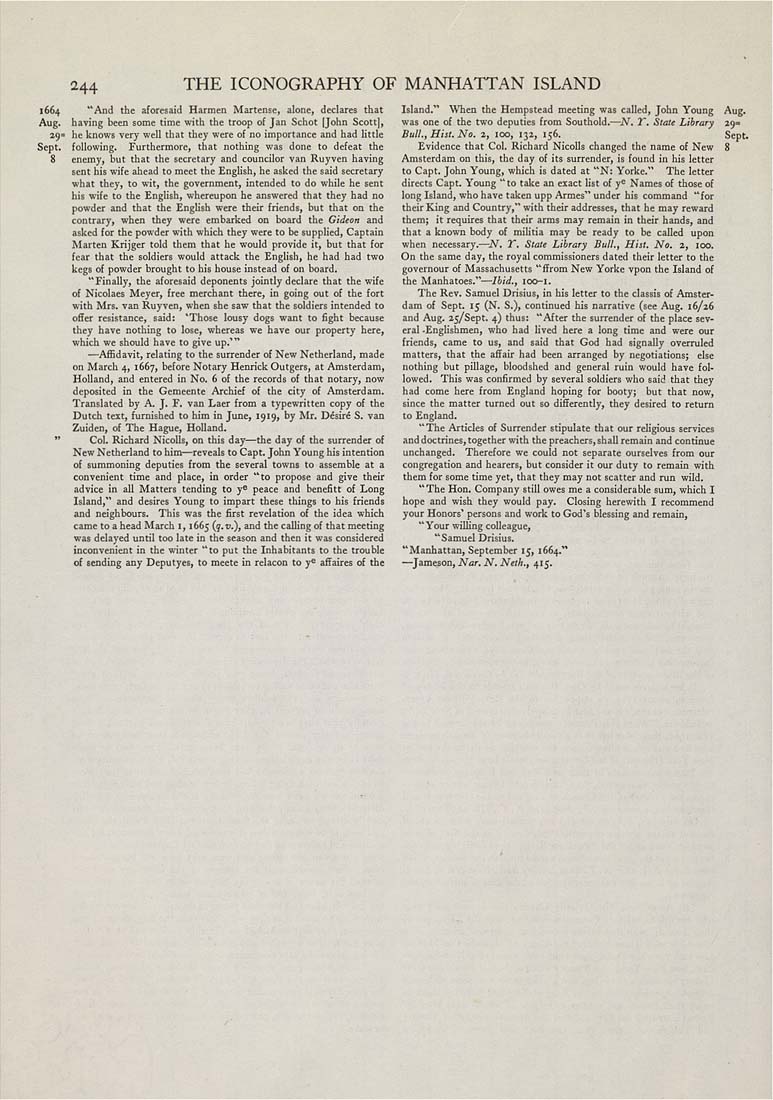244
THE ICONOGRAPHY OF MANHATTAN ISLAND
1664 "And the aforesaid Harmen Martense, alone, declares that
Aug. having been some time with the troop ot Jan Schot [John Scott],
19^ he knows very well that they were of no importance and had Uttle
Sept, tollowing. Furthermore, that nothing was done to defeat the
8 enemy, but that the secretary and councilor van Ruyven having
sent his wife ahead to meet the EngUsh, he asked Ihe said secretary
what they, to wit, the government, intended to do while be sent
his wife to the English, whereupon he answered that they had no
powder and that the English were their friends, but that on the
contrary, when they were embarked on board the Gideon and
asked for the powder with which they were to be supplied. Captain
Marten Krijger told them that he would provide it, but that for
tear that the soldiers would attack the English, he had bad two
kegs of powder brought to his house instead of on board.
"Finally, the aforesaid deponents jointly declare that the wife
of Nicolaes Meyer, free merchant there, in going out of the fort
with Mrs, van Ruyven, when she saw that the soldiers intended lo
offer resistance, said; 'Those lousy dogs want to fight because
they have nothing to lose, whereas we have our property here,
which we should have to give up.'"
—Affidavit, relating lo the surrender ot New Netherland, made
on March 4, 1667, before Notary Henrick Oulgers, at Amsterdam,
Holland, and entered in No, 6 of the records of that notary, now
deposited in the Gcmecnte Archiet of the city ot Amsterdam.
Translated by A. J. F. van Laer from a typewritten copy of the
Dutch text, furnished to him in June, 1919, by Mr. Desire S. van
Zuidcn, of The Hague, Holland,
" Col. Richard Nicolls, on this day—the day of the surrender ot
New Netherland to him—reveals to Capt, John Young his intention
of summoning deputies from the several towns to assemble at a
convenient time and place, in order "to propose and give their
advice in aU Matters tending to y^ peace and benefitt of Long
Island," and desires Young to impart these things to his friends
and neighbours. This was the first revelation of the idea which
came to a head March 1,1665 {q.v.), and the calUng of that meeting
was delayed until too late in the season and then it was considered
inconvenient in the winter "lo put the Inhabitants to the trouble
of sending any Deputyes, to meete in relacon to y^ affaires of the
Island." When the Hempstead meeting was called, John Young Aug.
was one of the two deputies from Southold.—N. Y. State Library 29"
Bull., Hist. No. 2, 100, 131, J56. Sept.
Evidence that Col, Richard NicoUs changed the name of New 8
Amsterdam on this, the day of its surrender, is found in his letter
to Capt, John Young, which is dated at "N: Yorke," The letter
directs Capt. Young "to take an eiact Ust of y" Names of those of
long Island, who have taken upp Armes" under his command "for
their King and Country," wilh their addresses, that he may reward
them; il requires that their arms may remain in their hands, and
that a known body of militia may be ready to be caUed upon
when necessary.—W. Y. State Library Bull., Hisl. No. 2, 100.
On the same day, the royal commissioners dated their letter to the
governour of Massachusetts "ffrom New Yorke vpon the Island of
the Manhatoes."—Ibid,, loo-l.
The Rev. Samuel Drisius, in bis letter to the classis ot Amster¬
dam ot Sept, 15 {N, S,), continued his narrative {see Aug, 16/26
and Aug. 25/Sept, 4) thus: "After the surrender of the place sev¬
eral .Englishmen, who had Jived here a long time and were our
friends, came to us, and said that God had signally overruled
matters, that the affair had been arranged by negotiations; else
nothing but pillage, bloodshed and general ruin would have fol¬
lowed. This was confirmed by several soldiers who said that they
had come here from England hoping for booty; but that now,
since the matter turned out so differently, they desired to return
to England,
"The Articles of Surrender stipulate that our reUglous services
and doctrines, together with the preachers, shaU remain and continue
unchanged. Therefore we could not separate ourselves from our
congregation and hearers, but consider it our duty to remain with
them for some time yet, that they may not scatter and run wild,
"The Hon, Company still owes me a considerable sum, which I
hope and wish they would pay. Closing herewith I recommend
your Honors' persons and work lo God's blessing and remain,
"Your wiUing colleague,
"Samuel Drisius,
"Manhattan, September 15, 1664."
—Jameson, Nar. N. Nelh., 415.
|








